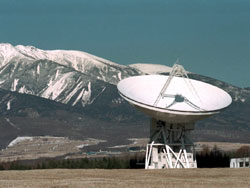|

The electric-wave telescope at Nobeyama.
|
Designing and
making Subaru was a very long process. It took over 20 years from
the idea stage to completion. Guiding the team through this journey
was the enthusiasm of scientists who wanted to see what was in
space as far away as 15 billion light years from the earth.
Japanese astronomy
has produced many positive results through the electric-wave telescope
installed at Nobeyama in Nagano Prefecture and through X-ray satellite
observation. Japan's biggest optical telescope used to be the
reflective telescope at Okayama Astrophysical Observatory, which
was completed in 1960 and has an aperture of 1.88 meters (6.2
feet).
The Okayama telescope
was the fifth largest in the world when it was built, but many
countries around the world have since built bigger telescopes.
Some astronomers had the idea of building a new, bigger telescope
and set off to study various places where a new observatory could
be built in Japan and other countries.
After deciding
where to build the telescope, the plan began with a request for
money from the government in 1991. During the planning the
team asked the public to suggest names for the telescope. About
3,500 ideas came from all over Japan, and Subaru was chosen as
the best.
|

The Pleiades, known as the Subaru in Japan.
|
Subaru is the
name of a star cluster in the Taurus constellation, known as the
Pleiades in the West. The six or seven bright stars in the cluster
have long been loved by people looking at the night sky. They
are even mentioned in The Pillow Book,
a famous essay collection from the Heian Period (794-1192). Subaru
actually comprises over 100 stars, including those that are not
so bright. It formed about 50 million years ago, which is quite
young for a star cluster.
However, just
as the telescope's name was decided and the plan began to take
shape, the mood in Japan changed. Economic problems caused people
to question big scientific projects that were unlikely to bring
immediate profits. "What use is a big telescope?" they
asked. Keiichi Ohira, who was the director of the National Astronomical
Observatory of Japan at the time, traveled backwards and forwards
between Hawaii and Japan many times in order to promote the Subaru
project. He was determined that Subaru should contribute to the
future development of astronomy.
The overall cost
of building Subaru was 40 billion yen. This is no small amount,
but results of observations are helping to unravel some of the
mysteries of the vast space surrounding the earth, including what
happened at the beginning of space and the existence of other
planets like the earth. The facility is used not only by Japanese
researchers but also by many groups from outside Japan. Subaru
is a treasure for all of humankind that is taking us on a heart-stopping
adventure to discover space.
Photos: National Astronomical Observatory of Japan
|